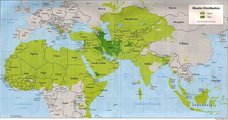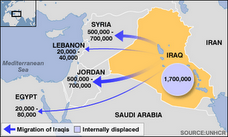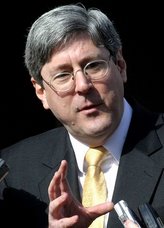By Raed Jarrar and Joshua Holland, AlterNet. Posted June 5, 2007.While most observers are focused on the U.S. Congress as it continues to issue new rubber stamps to legitimize Bush's permanent designs on Iraq, nationalists in the Iraqi parliament --now representing a majority of the body -- continue to make progress toward bringing an end to their country's occupation.
The parliament today passed a binding resolution that will guarantee lawmakers an opportunity to block the extension of the UN mandate under which coalition troops now remain in Iraq when it comes up for renewal in December. Prime Minister Nouri al-Maliki, whose cabinet is dominated by Iraqi separatists, may veto the measure.
The law requires that any future extensions of the mandate, which have previously been made by Iraq's Prime Minister, be approved by the parliament. It is an enormous development; lawmakers reached in Baghdad today said that they do in fact plan on blocking the extension of the coalition's mandate when it comes up for renewal six months from now.
Reached today by phone in Baghdad, Nassar al Rubaie, the head of Al-Sadr bloc in Iraq's Council of Representatives, said, "this new binding resolution will prevent the government from renewing the UN mandate without the parliament's permission. They'll need to come back to us by the end of the year, and we will definitely refuse to extend the UN mandate without conditions." Rubaie added: "there will be no such a thing as a blank check for renewing the UN mandate anymore, any renewal will be attached to a timetable for a complete withdrawal."
Without the cover of the UN mandate, the continued presence of coalition troops in Iraq would become, in law as in fact, an armed occupation, at which point it would no longer be politically tenable to support it. While polls show that most Iraqis consider U.S. forces to be occupiers rather than liberators or peace-keepers -- 92 percent of respondents said as much in a 2004 survey by the Independent Institute for Administration and Civil Society Studies -- the UN mandate confers an aura of legitimacy on the continuing presence of foreign troops on Iraq's streets, even four years after the fall of Saddam Hussein.
The resolution was initiated when a majority of Iraqi lawmakers signed a non-binding legislative petition two weeks ago that called on the Iraqi government to demand a withdrawal of all foreign troops from the country.
While the issue of the Multinational Force's (MNF) mandate has been virtually ignored by the American media, it has been a point of fierce contention in Baghdad. Last fall, just after the mid-term elections in the U.S., a coalition of Iraqi nationalists in the parliament tried to attach conditions to the extension of the mandate.
Iraqi lawmaker Jabir Habib (a Shia closely aligned with the al-Sadrist Movement), said in an interview last fall that the Iraqi Assembly had been poised to vote on the issue: "We spent the last months discussing the conditions we wanted to add to the mandate," he said, "and the majority of the Parliament decided on three major conditions. These conditions included pulling the coalition forces out of the cities and transferring responsibility for security to the Iraqi government, giving Iraqis the right to recruit, train, equip, and command the Iraqi security forces, and requiring that the UN mandate expire and be reviewed every six months instead of every 12 months."
Tuesday, June 5, 2007
Subscribe to:
Post Comments (Atom)





No comments:
Post a Comment